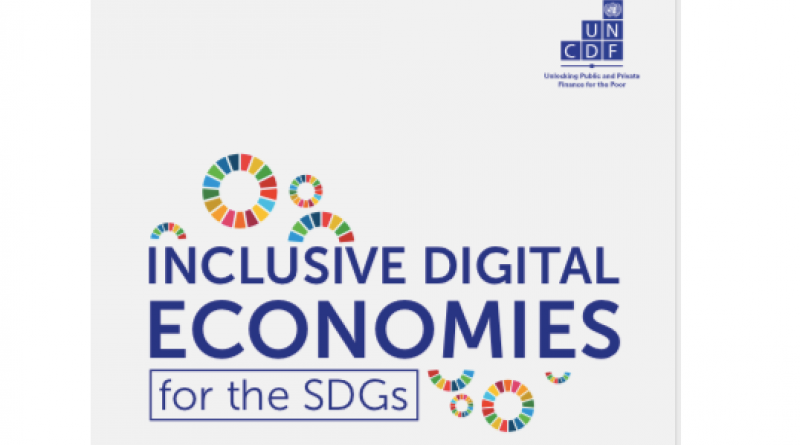UNCDF Releases Breakthrough Publication on Inclusive Digital Economies for the Sustainable Development Goals (SDGs)

THURSDAY 08 July 2021 (New York): The United Nations Capital Development Fund (UNCDF) has released a breakthrough publication ‘Inclusive Digital Economies for the Sustainable Development Goals’. Combining insights from across the organization along with expert contributions from over a dozen organizations, this publication outlines the future of digital economies and how to make the digital transformation inclusive.
Digital innovations in the areas of energy, agriculture, health, education, and mobility are already transforming how people access and use a range of services, often riding on the digital finance rails. It offers new opportunities to transform the lives of marginalized populations, particularly women, youth, migrants, refugees/FDPs, MSMEs, disabled, and people living in rural areas. This paper lays out the promise of digital technology and associated innovations in driving the inclusion and advancement of vulnerable populations. Building inclusive digital economies addresses pressing development challenges; it harnesses digital transformation in an inclusive manner to reach people at the last mile, and accelerates progress towards the Sustainable Development Goals (SDGs).
“As the world still struggles to confront the COVID-19 pandemic and its dire consequences, there is no doubt that technology has fundamentally reshaped our day to day lives. Technology has changed how children are taught, jobs are created, health services are delivered, traders do business, farmers get access to information, financial services are delivered, and the list goes on. UNCDF sees huge opportunities for businesses to serve those being left behind. This publication explores how affordable and accessible services can allow people to lead more resilient and secure lives. And importantly, how these services are not merely viable, but represent sound business opportunities,” said Preeti Sinha, Executive Secretary, UNCDF.
This publication builds on the analysis and insights from UNCDF team members working in Least Developed Countries across Africa, Asia and the Pacific. It also includes expert contributions from over a dozen partner organizations working towards an inclusive digital transformation. It looks at a number of issues and opportunities that digital offers in achieving the SDGs, specifically:
- How the growth of digital finance is leading to the emergence of digital economies and creating more opportunities to fast track the achievement of the SDGs.
- How UNCDF, through its four workstreams, address the constraints to inclusive market development.
- How digital solutions can best support vulnerable segments of the population and critical sectors of like agriculture, health and energy to name a few.
- How to finance inclusive digital economies through new approaches and resources, such as peer-to-peer platforms and blended finance.
“This is not just another paper on the digital transformation; it has a wealth of information for anyone involved in inclusive digital transformation. It is a practical tool for those looking for ideas on how to drive inclusive digital transformation in their respective country or organization. It offers new insights on how to leverage technology across sectors for the benefit of those most vulnerable, particularly women, migrants, and youth. We are grateful for the expert contributions from a number of partner organizations that makes this publication transcend any one organization. We look forward to working with partners across LDCs in building inclusive digital economies” – said François Coupienne, Global Digital Lead, UNCDF.
Over the coming months, UNCDF will be organizing a number of virtual sessions to bring stakeholders together to dive deep into the topics and issues explored in the paper. The first session on 08 July 2021 focuses on how the digital transformation in Least Developed Countries (LDCs) can support the SDGs in the COVID-19 era.
To access the publication and register for future events, please visit www.uncdf.org/ide4sdg
8 July 2021
UNCDF





